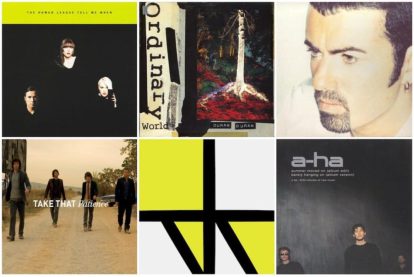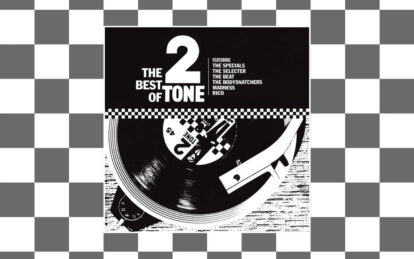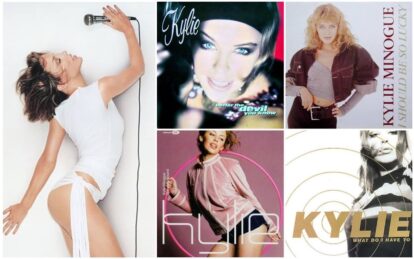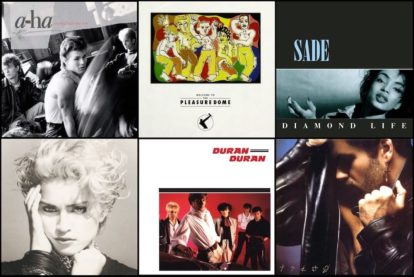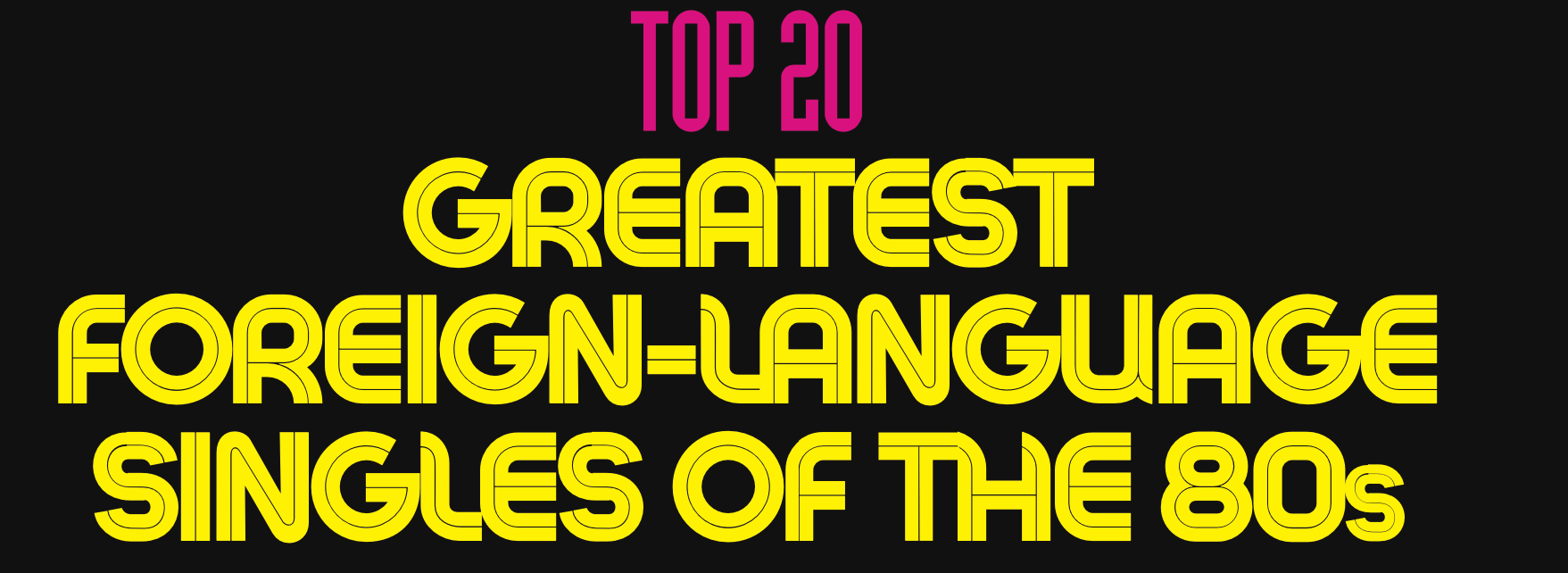
Top 20 greatest foreign-language singles of the 80s
Our run-down of the best foreign-language singles of the 1980s… By Jon O’Brien
As a whole, the UK’s record buyers have been stubbornly resistant to anything outside their native tongue. And unlike the cinemagoing and television-watching public, they don’t even have the ‘one-inch-tall barrier of subtitles’ as an excuse. But occasionally – just occasionally – a song not performed in English will sneak its way into our collective consciousness. From Latin hymns to Zulu dance anthems, here’s a look at 20 foreign-language singles which proved that 80s audiences weren’t entirely averse to lyrics that they didn’t necessarily understand.
20 Sarah Brightman & Paul Miles-Kingston: Pie Jesu
Joined by Winchester Cathedral’s Head Chorister Paul Miles-Kingston, Sarah Brightman distanced herself from her Hot Gossip days for good with this emotive interpretation of Pie Jesu. Taken from Requiem, her then-husband Andrew Lloyd Webber’s Grammy-winning tribute to his late father, the classical duet was a surprise No.3 hit in 1985. It has since become the ultimate modern version of the Latin text, with a spontaneous rendition on an ITV talent show helping to launch Charlotte Church’s career.
19 Julio Iglesias: Begin The Beguine
Twenty-one years before his son Enrique reached No.1 with Hero, housewife’s favourite Julio Iglesias achieved the same feat with an even more melodramatic ballad – and one sung entirely in his native Spanish, too. Back in the late 30s, RCA had dismissed this Cole Porter composition as a tune that “nobody could remember from beginning
to end.” Everyone from Sinatra to Elvis to tried to make it less forgettable over the next 40 years, but it took a translated version from a Latin lothario to make its way into the hearts of the UK’s record-buying public.
Check out our Top 20 Reunion Albums here
Read more: Top 20 80s collaborations
18 Corinne Hermès: Si La Vie Est Cadeau
Two of the decade’s seven foreign-language Eurovision winners managed to score a minor UK hit while still keeping their original lyrics intact. Sweden’s Herrey’s and their utterly ridiculous Diggi-Loo Diggi-Ley may be the more memorable, but Corinne Hermès’ Francophone entry Si La Vie Est Cadeau (If Life Is A Gift) is less likely to get you reaching for the earplugs. The ballad helped Luxembourg storm to their fifth and final victory at the annual event in 1983, pipping this rundown’s Israeli representative to the top of the scoreboard in the process.
17 Sérgio Mendes: Mas Que Nada ’89
Had this Mas Que Nada been a re-release of Sérgio Mendes’ seminal 1966 version, then it would have been competing for pole position. Unfortunately, the Brazilian icon decided to tinker with his signature hit – whose Portuguese title roughly translates as “Yeah, right” – for his 1989 album Arara. The result was a slightly tacky affair more likely to conjure up images of Blackpool Promenade than the beaches of Rio. Even so, those lilting rhythms still practically implore you to dust off your best samba moves.
16 Righeira: Vamos A La Playa
The UK largely remained immune to Righeira’s curious appeal in 1983, with their debut peaking at No.53 compared to the Top 10 across Europe. Perhaps we were puzzled by the fact this was an Italo-disco song performed by two Turin natives entirely in Spanish. Or that said duo resembled middle-aged men trying to blend in at a Club 18-30. Or that a song which translates as Let’s Go To The Beach was actually about the detonation of an atomic bomb. You can’t deny its catchiness, but this was one occasion when us Brits probably got it right.
Top 20 greatest foreign-language singles of the 80s
15 Vicious Pink: Je T’aime
Formerly backing singers with Soft Cell, keyboardist Brian Moss and vocalist Josephine Warden reached the lower end of the Top 100 on four occasions under the guise of Vicious Pink. The Leeds-based duo also became one of the few English acts to chart with a foreign-language song thanks to their cover of Je T’aime… Moi Non Plus. Not that you’d recognise much of Serge Gainsbourg and Jane Birkin’s classic, with the synth-pop pair adding a brand-new melody to the original’s dirty talk and surrounding it with electronic beats and throbbing basslines.
14 Trio: Da Da Da
You probably only remember the inane ‘da da da’ chorus but this 1982 one-hit wonder saw Trio teach English audiences several slightly more useful phrases in their native German, too. Covered on Elastica’s difficult second album, bizarrely enough, Da Da Da I Don’t Love You You Don’t Love Me Aha Aha Aha – to give its full title – was self-described as ‘Neue Deutsche Fröhlichkeit‘ (New German Happiness) by the oddball three-piece. The fact that it was only kept off the UK top spot by Irene Cara’s Fame proves that plenty bought into its casual jubilance.
13 Jimmy Somerville and June Miles-Kingston: Comment Te Dire Adieu
The older cousin of No.20’s choirboy, June Miles-Kingston started out drumming for post-punks the Mo-dettes before providing backing vocals for everyone from Big Country to The Communards. A year after the latter’s break-up, Jimmy Somerville again invited her to complement his famous falsetto on a cover of a cover. Recorded in 1968 by Françoise Hardy, Comment Te Dire Adieu was a French-language adaptation of It Hurts To Say Goodbye, a tune that Vera Lynn had scored a Billboard hit with the previous year.
Top 20 greatest foreign-language singles of the 80s
12 Bananarama: Aie a Mwana
A Swahili-language cover of an obscure French disco anthem? Bananarama didn’t exactly take the most obvious route to stardom with their debut single. First recorded by Ottawan hitmakers Daniel Vangarde and Jean Kluger then Afrobeat collective Black Blood, the playful new wave of Aie A Mwana may not have set the charts alight but it did play a pivotal role in the Nanas’ story. A favourable review in The Face sparked the interest of Terry Hall and within a few months they were sharing the stage with Fun Boy Three on Top Of The Pops.
11 Gipsy Kings: Bamboléo
One of those songs you naturally assume charted much higher than it did, Gipsy Kings’ Bamboléo has become the barbecue soundtrack of choice since peaking at a lowly No.87 in 1989. The Gitano-French outfit even went one better with their take on Volare, the Dean Martin standard that strangely began life as a Eurovision winner. But it’s this self-penned composition, a sunshine-soaked mix of furiously-strummed flamenco guitars, rumba beats and fiery vocals, that best accompanies the art of flipping burgers.
Read more: Top 20 side projects
Read more: Top 20 80s pop instrumentals
10 Clannad: Theme from Harry’s Game
As its title suggests, Clannad’s Gaelic-language breakthrough hit soundtracked ITV’s Harry’s Game, a gritty drama about a British special agent’s undercover mission in the IRA. While the miniseries has largely been forgotten, its eerily stark theme became a defining moment of the New Age scene, reaching No.5 in the UK, and featured on countless TV ads. Later utilised on Chicane’s lush trance classic Saltwater, Máire Brennan’s haunting melodies still have the power to raise those hairs on the back of your neck 40 years on.
Top 20 greatest foreign-language singles of the 80s
9 Falco: Rock Me Amadeus
While Nena turned her 99 Luftballons into red balloons to enjoy chart success outside Europe four years earlier, Falco kept his stuttering tribute to Wolfgang Amadeus Mozart almost entirely German. Somehow, Rock Me Amadeus still topped the charts on both sides of the Atlantic. Loosely inspired by Miloš Forman’s big screen biopic of the 18th century composer, the whole thing is entirely ridiculous, of course. But crucially, Falco, a former child prodigy pianist-turned-punk bassist who rechristened himself after a ski jumper, appears to know it, too.
8 Vanessa Paradis: Joe Le Taxi
Vanessa Paradis was just 14 when she reached No.3 with the cocktail bar jazz of Joe Le Taxi. Also an 11-week chart-topper in her native France, the sax-led track has a much deeper backstory than you might think. The Parisian cab driver with a penchant for rum and mariachi music isn’t the kind of sharp-suited man you see in the video. Paradis is actually commemorating Maria José Leão dos Santos, a fixture of the capital’s LGBT scene who was once forced to flee her Portuguese homeland’s Estado Novo authoritarian regime.
7 Kraftwerk: Tour de France
Twenty years before dedicating an entire album to the Tour de France, Kraftwerk took fans on a much brisker journey through the world’s most iconic cycling race for this 1983 one-off single. Performed in French, the electronic wizards sound uncharacteristically human here, while its soaring strings and ethereal harp melody help to conjure up images of its lush mountainous landscapes. But it was the inspired percussive use of clicking bike spokes and heavy breathing that truly earned the Germans their yellow jersey.
6 Kaoma: Lambada
For such a carefree summer anthem, Kaoma’s Portuguese-sung Lambada didn’t half cause some trouble. The global smash, a mashup of two covers of the same song, confusingly enough, failed to credit the 1981 Bolivian folk number that all three borrowed from. Cue a lawsuit that denied the French-Brazilian outfit any profits from the five million copies sold. Ignore all the behind-the-scenes drama, however, and you can see why its hypnotic Latin rhythms and accordion riffs sparked such an (extremely brief) craze.
Top 20 greatest foreign-language singles of the 80s
5 Los Lobos: La Bamba
Originating from the jungles of Mexican state Veracruz in the early 20th century, fiesta favourite La Bamba took some time travelling across the other side of the Atlantic. It needed a Tex-Mex cover and a Lou Diamond Phillips-starring biopic to finally bring the Spanish-sung traditional to our attention. Recorded for the same-named life story of ill-fated rock’n’roller Ritchie Valens, Los Lobos’ gleeful take enjoyed a two-week chart-topping stint in the summer of 1987. And if you’re still wondering what La Bamba means, well, it’s basically just the name of a dance.
4 The Art Of Noise: Yebo!
Anne Dudley and JJ Jeczalik leaned into their love of world music for what would be Art Of Noise’s last album for a decade. And who better to lend some authenticity than the South African supergroup that one year earlier had stolen the show at Nelson Mandela’s 70th birthday Wembley Stadium bash? Mahlathini And The Mahotella Queens displayed their exuberant harmonies on three tracks from 1989’s Below The Waste. But Yebo!, a Zulu-language ode to Zulu dancing that may well have given The KLF a few ideas, was the keeper.
3 Desireless: Voyage, Voyage
The moody synth-pop of Desireless’ Voyage, Voyage had been a smash all across Europe in 1987 but failed to climb any higher than No.53 in the UK. Step forward Pete Waterman, then firmly in his untouchable phase, and PWL’s resident mixer Pete Hammond. Their punchier revamp sent Claudie Fritsch-Mentrop, an androgynous, sweeping brush-haired lookalike (and indeed soundalike) of Annie Lennox, all the way to No.5 a year later. You had to wait until 1997 and Sash!’s shouty trance anthem Encore Une Fois for a bigger French-language hit.
2 Mory Kanté: Yé ké yé ké
Combining propulsive tribal rhythms with the spellbinding chants of Guinean legend Mory Kanté, Yé Ké Yé Ké swept the continent in 1988, topping the charts in Switzerland, France and Belgium. UK audiences weren’t quite as receptive to the bona-fide banger. However, after peaking at No.28 a year later, the unlikely dancefloor hit also re-entered the Top 30 twice in the 90s. Taken from the former Rail Band frontman’s third solo album, Akwaba Beach, the Mandinka-sung Yé Ké Yé Ké remains the biggest-selling African single of all time.
…and top of the list of our foreign-language singles…
1 Ofra Haza: Im Nin’alu
Dubbed the ’Israeli Madonna’, Ofra Haza transcended cultural boundaries like few other Middle Eastern artists had done before. She collaborated with acts as diverse as The Sisters Of Mercy, Paula Abdul and Thomas Dolby, performed her The Prince Of Egypt musical number in 18 different languages and even became an unlikely favourite of the hip-hop scene. In fact, it was Coldcut’s sampling of Im Nin’alu’s a cappella opening on their seminal remix of Eric B And Rakim’s Paid In Full that introduced the star to an ever wider audience. Haza had first performed her unique interpretation of Rabbi Shalom Shabazi’s 17th century Hebrew poem on national TV in 1978.
A more danceable version arrived on her album Yemenite Songs six years later. But it was only when producer Izhar Ashdot gave its spiritual sentiment an electronic sheen for 1988’s Shaday that Im Nin’alu deservedly became a European hit in its own right. Reaching No.15 in the UK and the top spot across the continent, the inspired reworking’s clattering percussion and beefy synth-basslines helped transfer the traditional from the synagogue to the clubs. But even with the odd bit of studio trickery, it never forgets that Haza’s mezzo-soprano is the main attraction.
Classic Pop may earn commission from the links on this page, but we only feature products we think you will enjoy.


